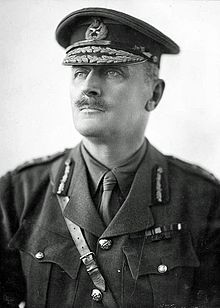Jack Cohen – Allenby in Palestine
Elkan Levy, who was a former President of the UK United Synagogue, is an excellent raconteur who gave a wonderful lecture filled with interesting anecdotes. He spoke on “Allenby in Palestine” during WWI. [The British misnamed the Holy Land “Palestine” after the Romans, who named it Philistia for the Philistines, who no longer existed, rather than admitting its Jewish connection, since they intended to incorporate it into their Empire.] This is my brief summary of his talk.
Considering men who influenced the development of British policy in the Middle East, he started with Herbert Samuel, who was the first Jew to hold a Cabinet position in the UK Government. Samuel, who became a Viscount and the first British High Commissioner in Palestine after WWI, was an ardent Zionist, unlike most of his Anglo-Jewish contemporaries who feared the development of a Jewish State would undermine their British status. When Turkey entered WWI in Oct. 1914, the issue of the Zionists who were already lobbying for a Jewish State in the Turkish Empire became relevant. Samuel started the ball rolling by talking to his Cabinet colleagues about this, which led ultimately to the issuance of the Balfour Declaration in 1917 by the Foreign Secretary Lord Balfour.
Once the War started the Cabinet was split between the “Westerners” and the “Easterners,” i.e. those who believed that the main theater of action was in Europe and those who thought that it was necessary to open a second front in the East to attack the Turks and so divert German troops from Europe. Winston Churchill, First Lord of the Admiralty, was an Easterner who proposed the idea of attacking the Dardanelles, expecting that the Turks would be easily defeated. However, when a flotilla of British war ships approached the Dardanelles they received some bombardment. They retreated and waited for ground troops to be brought up. This lull allowed the Turks under Mustafa Kemal to bring in reinforcements and when the Allied troops (mostly ANZAC) landed at Gallipoli they were trapped and slaughtered. This defeat resulted in the Eastern theater being confined to the Egypt/Palestine front.
Initially from 1916 the Egyptian Expeditionary Force (EEF) was commanded by Gen. Archibald Murray. Although he managed to defeat two attempts by the Turkish forces in Gaza from capturing the Suez Canal, he was incompetent and lost two further battles trying to attack Gaza with large casualties. When Lloyd George became PM in 1916 he replaced Murray and his choice fell on Gen. Edmund Allenby. He had commanded British forces at the first battle of Arras in France and had managed to push the Germans back 3.5 miles, which was an accomplishment under the circumstances. He was at first reluctant to take this job, but was persuaded. Lloyd George’s final words to him were to give the British people a Christmas present, Jerusalem.
Allenby was a very blunt and forceful man, known to his troops as “The Bull.” He moved his HQ near to the front line at Rafah and inspected his troops often, thus increasing morale. Information he received from the Aaronson family of spies, the NILI from Zichron Yaakov, indicated that there were sources of water in the Sinai desert. With his intelligence officer Richard Meinertzhagen, Allenby developed a plan instead of attacking directly again at Gaza, the troops would cross the Sinai and attack the relatively vulnerable Turkish garrison at Beersheba.
In order to do this Meinertzhagen devised a plan in which he put military orders for an impending attack at Gaza together with personal materials to make it seem more authentic in a haversack. He then dropped this near the Turkish lines while under fire and it was found by the Turks. This tricked them into thinking that the next attack would come again at Gaza, whereas in fact the surprise attack on Beersheva was a complete success, thanks to the Australian Light Horse infantry cavalry charge that was the last in history. Once Beersheva was captured, Gaza was vulnerable from the rear and the Turks were forced to withdraw up the coast. As a result, Allenby was able to capture Jerusalem and give the British people their first great success of the war – before Christmas 1917.
The Turkish military staff were commanded by Germans. Gen. Erich von Falkenhaym was defeated by Allenby at Jerusalem. The Turkish Empire on its last legs was governed by a triumvirate of three Pashas. They had been responsible for ordering the massacres of Armenians during WWI. Now with the loss of Jerusalem looming they ordered the Turkish military to massacre the Jewish inhabitants of Jerusalem before they withdrew, but the German General Staff countermanded this order. With the subsequent victory at the battle of Megiddo, Allenby’s forces rapidly moved to capture Damascus, leading to the total collapse of Turkish resistance.









